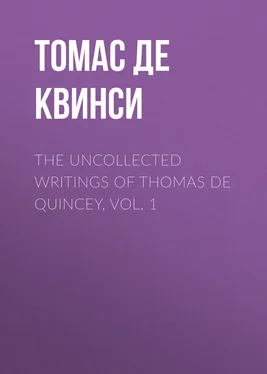Томас Де Квинси - The Uncollected Writings of Thomas de Quincey, Vol. 1
Здесь есть возможность читать онлайн «Томас Де Квинси - The Uncollected Writings of Thomas de Quincey, Vol. 1» — ознакомительный отрывок электронной книги совершенно бесплатно, а после прочтения отрывка купить полную версию. В некоторых случаях можно слушать аудио, скачать через торрент в формате fb2 и присутствует краткое содержание. Жанр: foreign_prose, literature_19, foreign_antique, на английском языке. Описание произведения, (предисловие) а так же отзывы посетителей доступны на портале библиотеки ЛибКат.
- Название:The Uncollected Writings of Thomas de Quincey, Vol. 1
- Автор:
- Жанр:
- Год:неизвестен
- ISBN:нет данных
- Рейтинг книги:4 / 5. Голосов: 1
-
Избранное:Добавить в избранное
- Отзывы:
-
Ваша оценка:
- 80
- 1
- 2
- 3
- 4
- 5
The Uncollected Writings of Thomas de Quincey, Vol. 1: краткое содержание, описание и аннотация
Предлагаем к чтению аннотацию, описание, краткое содержание или предисловие (зависит от того, что написал сам автор книги «The Uncollected Writings of Thomas de Quincey, Vol. 1»). Если вы не нашли необходимую информацию о книге — напишите в комментариях, мы постараемся отыскать её.
The Uncollected Writings of Thomas de Quincey, Vol. 1 — читать онлайн ознакомительный отрывок
Ниже представлен текст книги, разбитый по страницам. Система сохранения места последней прочитанной страницы, позволяет с удобством читать онлайн бесплатно книгу «The Uncollected Writings of Thomas de Quincey, Vol. 1», без необходимости каждый раз заново искать на чём Вы остановились. Поставьте закладку, и сможете в любой момент перейти на страницу, на которой закончили чтение.
Интервал:
Закладка:
Such was the advantage—a mighty advantage—for Greece. Now, finally, for the use made of this advantage. To that point I have already spoken. By the clamorous and undeliberative qualities of the Athenian political audience, by its fitful impatience, and vehement arrogance, and fervid partisanship, all wide and general discussion was barred in limine . And thus occurred this singular inversion of positions—the greatest of Greek orators was obliged to treat these Catholic questions as mere Athenian questions of business. On the other hand, the least eloquent of British senators, whether from the immense advance in knowledge, or from the custom and usage of Parliament, seldom fails, more or less, to elevate his intense details of pure technical business into something dignified, either by the necessities of pursuing the historical relations of the matter in discussion, or of arguing its merits as a case of general finance, or as connected with general political economy, or, perhaps, in its bearings on peace or war. The Grecian was forced, by the composition of his headstrong auditory, to degrade and personalise his grand themes; the Englishman is forced, by the difference of his audience, by old prescription, and by the opposition of a well-informed, hostile party, into elevating his merely technical and petty themes into great national questions, involving honour and benefit to tens of millions.
THE GERMAN LANGUAGE, AND PHILOSOPHY OF KANT
Using a New Testament, of which (in the narrative parts at least) any one word being given will suggest most of what is immediately consecutive, you evade the most irksome of the penalties annexed to the first breaking ground in a new language: you evade the necessity of hunting up and down a dictionary. Your own memory, and the inevitable suggestions of the context, furnish a dictionary pro hac vice . And afterwards, upon advancing to other books, where you are obliged to forego such aids, and to swim without corks, you find yourself already in possession of the particles for expressing addition, succession, exception, inference—in short, of all the forms by which transition or connection is effected ( if , but , and , therefore , however , notwithstanding ), together with all those adverbs for modifying or restraining the extent of a subject or a predicate, which in all languages alike compose the essential frame-work or extra-linear machinery of human thought. The filling-up—the matter (in a scholastic sense)—may differ infinitely; but the form , the periphery, the determining moulds into which this matter is fused—all this is the same for ever: and so wonderfully limited in its extent is this frame-work, so narrow and rapidly revolving is the clock-work of connections among human thoughts, that a dozen pages of almost any book suffice to exhaust all the επεα πτεροεντα 20 20 Επεα πτεροεντα, literally winged words . To explain the use and origin of this phrase to non-classical readers, it must be understood that, originally, it was used by Homer to express the few, rapid, and significant words which conveyed some hasty order, counsel, or notice, suited to any sudden occasion or emergency: e. g. 'To him flying from the field the hero addressed these winged words—"Stop, coward, or I will transfix thee with my spear."' But by Horne Tooke, the phrase was adopted on the title-page of his Diversions of Purley , as a pleasant symbolic expression for all the non-significant particles, the articuli or joints of language, which in his well-known theory are resolved into abbreviations or compendious forms (and therefore rapid, flying, winged forms), substituted for significant forms of greater length. Thus, if is a non-significant particle, but it is an abbreviated form of an imperative in the second person—substituted for gif, or give, or grant the case—put the case that. All other particles are shown by Horne Tooke to be equally shorthand (or winged ) substitutions.
which express them. To have mastered these επεα πτεροεντα is in effect to have mastered seven-tenths, at the least, of any language; and the benefit of using a New Testament, or the familiar parts of an Old Testament, in this preliminary drill, is, that your own memory is thus made to operate as a perpetual dictionary or nomenclator. I have heard Mr. Southey say that, by carrying in his pocket a Dutch, Swedish, or other Testament, on occasion of a long journey performed in ' muggy ' weather, and in the inside of some venerable 'old heavy'—such as used to bestow their tediousness upon our respectable fathers some thirty or forty years ago—he had more than once turned to so valuable an account the doziness or the dulness of his fellow-travellers, that whereas he had 'booked' himself at the coach-office utterly αναλφαβητος, unacquainted with the first rudiments of the given language, he had made his parting bows to his coach brethren (secretly returning thanks to them for their stupidity), in a condition for grappling with any common book in that dialect. One of the polyglot Old or New Testaments published by Bagster, would be a perfect Encyclopædia, or Panorganon , for such a scheme of coach discipline, upon dull roads and in dull company. As respects the German language in particular, I shall give one caution from my own experience, to the self-instructor: it is a caution which applies to the German language exclusively, or to that more than to any other, because the embarrassment which it is meant to meet, grows out of a defect of taste characteristic of the German mind. It is this: elsewhere, you would naturally, as a beginner, resort to prose authors, since the license and audacity of poetic thinking, and the large freedom of a poetic treatment, cannot fail to superadd difficulties of individual creation to the general difficulties of a strange dialect. But this rule, good for every other case, is not good for the literature of Germany. Difficulties there certainly are, and perhaps in more than the usual proportion, from the German peculiarities of poetic treatment; but even these are overbalanced in the result, by the single advantage of being limited in the extent by the metre, or (as it may happen) by the particular stanza. To German poetry there is a known, fixed, calculable limit. Infinity, absolute infinity, is impracticable in any German metre. Not so with German prose. Style, in any sense, is an inconceivable idea to a German intellect. Take the word in the limited sense of what the Greeks called Συνθεσις ονοματων— i. e. the construction of sentences—I affirm that a German (unless it were here and there a Lessing) cannot admit such an idea. Books there are in German, and, in other respects, very good books too, which consist of one or two enormous sentences. A German sentence describes an arch between the rising and the setting sun. Take Kant for illustration: he has actually been complimented by the cloud-spinner, Frederic Schlegel, who is now in Hades, as a most original artist in the matter of style. 'Original' Heaven knows he was! His idea of a sentence was as follows:—We have all seen, or read of, an old family coach, and the process of packing it for a journey to London some seventy or eighty years ago. Night and day, for a week at least, sate the housekeeper, the lady's maid, the butler, the gentleman's gentleman, &c., packing the huge ark in all its recesses, its 'imperials,' its 'wills,' its 'Salisbury boots,' its 'sword-cases,' its front pockets, side pockets, rear pockets, its 'hammer-cloth cellars' (which a lady explains to me as a corruption from hamper-cloth , as originally a cloth for hiding a hamper, stored with viaticum ), until all the uses and needs of man, and of human life, savage or civilised, were met with separate provision by the infinite chaos. Pretty nearly upon the model of such an old family coach packing, did Kant institute and pursue the packing and stuffing of one of his regular sentences. Everything that could ever be needed in the way of explanation, illustration, restraint, inference, by-clause, or indirect comment, was to be crammed, according to this German philosopher's taste, into the front pockets, side pockets, or rear pockets, of the one original sentence. Hence it is that a sentence will last in reading whilst a man
Интервал:
Закладка:
Похожие книги на «The Uncollected Writings of Thomas de Quincey, Vol. 1»
Представляем Вашему вниманию похожие книги на «The Uncollected Writings of Thomas de Quincey, Vol. 1» списком для выбора. Мы отобрали схожую по названию и смыслу литературу в надежде предоставить читателям больше вариантов отыскать новые, интересные, ещё непрочитанные произведения.
Обсуждение, отзывы о книге «The Uncollected Writings of Thomas de Quincey, Vol. 1» и просто собственные мнения читателей. Оставьте ваши комментарии, напишите, что Вы думаете о произведении, его смысле или главных героях. Укажите что конкретно понравилось, а что нет, и почему Вы так считаете.












